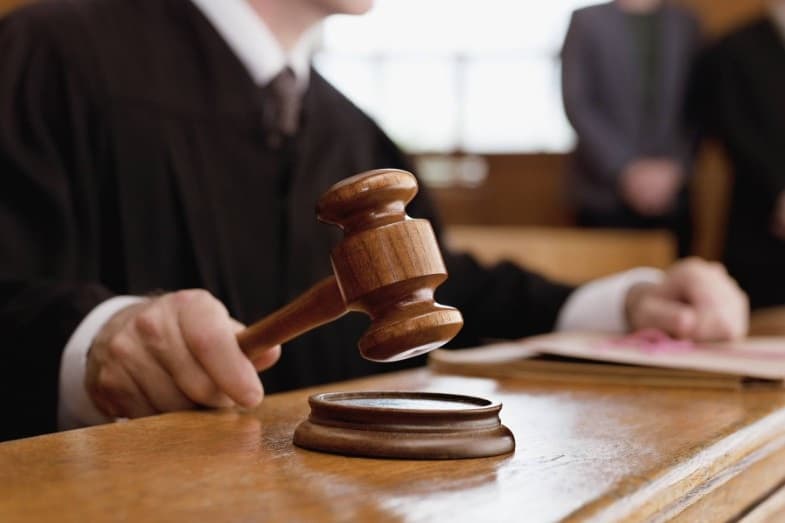If you have missed rent once or more, it is natural to wonder what will happen. A common question that comes up is if you can go to jail for not paying? Can you go to jail for not paying rent?
You can’t go to jail for not paying your rent. However, the landlord can institute a wage garnishment for your unpaid rent. They can also file a civil suit requesting for your eviction to regain possession of his property. Another option is for the landlord to go for money judgments.
In the United States, a hundred years ago, you could go to jail for not paying rent. Nowadays, however, not paying rent is between individuals and is not considered a criminal offense.
Read more to learn more about what happens when you don’t pay rent and how long you can go without paying.
Can You Go to Jail for Not Paying Rent?
You can’t go to jail for not paying your rent. However, the landlord can institute a wage garnishment for your unpaid rent. They can also file a civil suit requesting for your eviction to regain possession of his property.
Although not paying rent will not put you to jail in the U.S. and most countries, it could incur a civil case. If you really have valid reasons why you can’t pay rent, you can seek an amicable settlement, providing a payment option with your landlord without going to court.
However, if your landlord is uncooperative, they may sue you for a civil offense. The landlord may request your eviction as well. Some states have enacted local ordinances that have put eviction on hold amidst the COVID-19 pandemic. However, if you’re residing in a state with no eviction holds, you don’t have any other option but to evacuate the premises.
However, take note that you can go to jail for other offenses, such as attacking the landlord physically during an altercation about your non-payment. This action would constitute assault charges and violence, which is a felony or a criminal offense. Also, issuing a bouncing check in bad faith is a felony in most U.S. states.
What Happens If You Cannot Pay Rent?
If you cannot pay rent, your landlord can do the following:
- Agree to a payment plan
- Reduce your rent
- Opt for a wage or property garnishment
- Request the court to issue an eviction notice
- Sue you for a civil offense
- Evict you from the premises
But, they can never put you in jail due to the non-payment of your rent.
What to Do If You Cannot Pay Rent
Here are the steps you can follow if you cannot pay rent:
Step #1 – Know What Rental Laws Are in Place in Your State
Determine if there are eviction protections in your particular state or country. Also, listen and watch current news to find out modifications to the laws already in place. Knowing the existing laws regarding your rights as a tenant could significantly help you plan your next moves.
In the United States, debtor’s prisons are unlawful. Don’t be afraid when your landlord threatens you with jail time. Although they can sue you in a civil court, you will not be spending time in jail.

Step #2 – Contact Your Landlord Beforehand and Work out a Payment Plan
If you cannot pay your next rent, act beforehand, and get in touch with your landlord. Present to them documents or proof showing that you couldn’t meet next month’s rent payment.
An example of these documents is your employer’s certification that you can go back to work eventually. If you’re unemployed, they would also need evidence of this fact. Be sincere and act in good faith. A good landlord would appreciate your honesty and sincerity.
Your attitude would convince them that you don’t intend to run away or shirk your responsibility. Letting them understand that you truly don’t have the means to pay them the next month would prevent future civil cases.
Moreover, you can also work out a payment plan with them by providing an acceptable payment option. The best you can do is obtain a rental-deferment agreement from them. Any agreement with your landlord should be in writing that you both must sign.
You should also read and understand the content of the document before signing. Ask your landlord questions when in doubt and clarify ambiguous statements. If you want it to be more binding, you can have it stamped by a notary public.
Step #3 – Request for a Reduced Rent for the Months You’re out of Work
You could request a reduced rent during the time that you’re out of work. If your landlord disagrees, you can try to ask for a month or three months of reduced rent. You can explain to them that you would make up for the amount later on when you become financially stable.
Step #4 – Find Government Assistance
You can ask your local or national government if they provide eviction protections or offer financial assistance to individuals in the same predicament. Some states have eviction protections during the COVID-19 pandemic.
You can inquire from your local government if your state is one of them. Also, find out if you can obtain a loan or financial assistance from the U.S. Treasury Department or the Housing and Urban Development office.
Inquire where you can obtain federal funds or federal financial programs from your state. Rental Assistance Programs exist in some states. You just have to inquire from your local government.
For the current pandemic situation, if you’re under the CARES Act, eviction protection is in place. Here’s a list of the states under the CARES Act in the U.S.
Step #5 – Seek Your Bank’s Assistance
In case Step #4 doesn’t work out, you could visit your bank. If you are a depositor in good standing, the bank may grant you a loan. Of course, you have to submit any pertinent papers they require from you. Don’t lie about the state of your finances, as the bank could find out the truth real quick. Be honest, and the bank may understand your predicament.
Step #6 – Consult a Lawyer
If not one of the previous methods works, you could consult a lawyer to learn the next legal step. There are excellent inexpensive lawyers out there who can help you with your problem. Also, make sure you lay all your cards on the table. Not telling them all the facts could jeopardize your case.
We’ve answered the question, “Can you go to jail for not paying rent?” Now, let’s look at how long you can go without paying your rent, including other unpaid rent consequences.
How Long Can You Go Without Paying Rent?
You can go for at least two months of not paying your rent before the court issues your eviction notice. The processing of eviction notices could take around two to three months.
When it’s processed, the court will issue the eviction notice after 30 days of non-payment. But, the eviction notice would only allow you three to ten days to vacate the premises.
When you have the financial means to pay, don’t wait for the eviction notice because this bad financial report will stay in your credit rating for at least seven years. This bad report could negatively affect your future applications for bank loans or housing.
What to Do If the Landlord Is Taking You to Court

If your landlord decides to take you to court, you can pay what is due, and the court will close the case. In instances when the incident escalates due to your lack of funds, you will have to consult a lawyer to help you out because it’s already a legal issue.
As much as possible, avoid unpaid rents because you would have to pay them just the same in the future. You would also need a lot of cash then. So, try to pay in increments or installments at the moment – if your landlord agrees. If the court orders you to pay, you don’t have any option but to abide by the court’s decision.
You don’t want creditors to ban you forever because of your unpaid rent. It would take years to clear your bad credit history too.
Summary of the Bad Consequences of Unpaid Rent
- You will obtain a bad or poor credit rating. Also, when you get reported, your credit cards may be put on hold.
- Your landlord could report you or put your name in the list of delinquent tenants, and landlords could ban you for many years unless the government enacts a federal law to grant you a reprieve.
- Banks will not grant you loans due to your poor credit rating.
- Background checks would reveal your unpaid rent. This record could affect your good standing in your community.
- The landlord could garnish your wages.
- Your landlord can evict you. As discussed, they can evict you after proper notice.
What to Do If You Receive an Eviction Notice
- Pay the amount due within ten days after the eviction notice, and they can’t evict you.
- Have a heart-to-heart dialogue with the landlord and express your desire to pay up; you just don’t have enough cash. Appeal to his humane side. People tend to soften up when they learn about predicaments similar to yours. Respectfully request them to withdraw the eviction notice from the court.
- Find out if there are any eviction protection laws in your state. Use it to prevent eviction. Also, determine if the landlord had complied with federal regulations before he went to court to evict you.
- Consult your lawyer on how to prevent eviction. They know best what legal steps you can do to stop the process. If your lawyer cannot stop the process, you will have to obey what the court orders.
- Report to court and convince the judge that there are no other alternatives for you in your present situation, and you cannot stay homeless in the streets. The judge might empathize with you.
- Look for alternative places you can stay ahead of time. But don’t leave the area until a sheriff comes and orders you to vacate. Who knows? There might be modifications to the eviction law during the waiting period.
Tips on Avoiding Non-Payment of Rent
1. Save Money for Rainy Days
Knowing how to put aside contingency money while you have stable earnings will help you out during rainy days. This fund must be apart from your savings.
Additionally, make it a habit to save a certain percentage of your monthly paycheck. Try saving as little as $200 to $500 a month. You can also put aside money every day or every week into a ‘rent box’ to ensure that your payment is ready within a month.
2. Make Your Home One of Your Priorities
Your abode is essential for you to live properly. Make it your priority – aside from food – when paying your monthly bills.
3. Secure Insurance
Secure insurance that can help you out during times that you could not pay your rent.
Conclusion – Can You Go to Jail for Not Paying Rent?
You will not go to jail for not paying rent. But you can get evicted and get sued in a civil court. The landlord could also opt for wage garnishment or gain.
100 years ago, people who were unable to pay their rental fees went to jail and did hard labor to pay off their debts. Today, this is considered an act of discrimination against the poor. So, several countries, including the United States, have eliminated this criminal liability in their areas.
If you have the financial means, don’t wait for this problem to escalate into an eviction notice. Try your best to avoid it because once you receive an eviction notice, there will be several unfavorable effects, as mentioned above.



